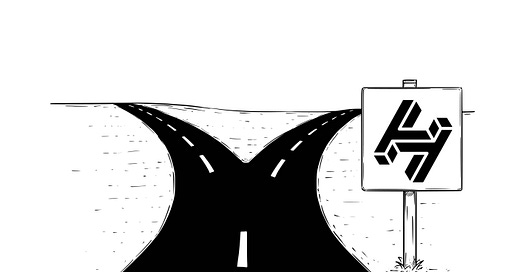This writing is a self-reflection with the intention of sharing thoughts on why I am in favor of a hard fork for Handshake (HNS). Like many, what attracted me to Handshake was the decentralized nature of the protocol. It was a breath of fresh air compared to the scams and fly-by-night projects that have been cranked out over the past decade. HNS is a narrowly focused technology; DNS on blockchain. This was espoused by Satoshi Nakamoto back in 2010 as the second potential use case for blockchain technology, after money.
The fact that the web’s foundation and underlying workings is controlled by a few entities is preposterous in the year 2024; it is time for an upgrade! We must remember the problems that HNS can solve. For me, adoption of HNS can lessen government and Big Tech censorship, while safeguarding freedom of speech, expression, and assembly online.
Handshake has a similar ethos to Bitcoin. There needs to be consensus from the community in order to make changes to the protocol. Even with Bitcoin’s conservative nature, the protocol has experienced multiple soft and hard forks over the years. On the other hand, Handshake has had one soft fork, which coincided around its fourth birthday in early 2024.
While Satoshi Nakamoto worked on Bitcoin for four years post-launch (2009-2012), HNS co-creators had a more gloves off approach. They were nowhere to be seen in the early years of HNS, and instead, preferred to lurk in the background or otherwise disappear completely.
Although there have been thousands of crypto and NFT projects launched since 2020, only one was truly decentralized: Handshake. The unfortunate reality is that all of the noise, elevated in part by venture capitalists and degenerate gamblers, have drowned out the merits and real-world potential of HNS so far. While my world view is that the truth always prevails eventually, it will behoove us to recognize the challenges that we face as a community.
In an unpublished writing by Joseph Poon (Lightning Network and Handshake co-creator), he recognized that Handshake would face “The Tyranny of Structurelessness,” which is when both the system and social structure around it does not have a defined leadership. Poon then wrote, “Handshake does not have any centralized foundation in charge of developing the protocol, nor does the funds from name registration go to a central active participant with the mandate of maintaining the system. Consequently, there arises a serious need for community coordination on the issue of protocol changes, community identity, and economic incentives.”
The Handshake V2 Proposal that Andrew Lee (Handshake co-creator) and I have crafted intends to address this and other immediate needs in a honest manner. The proposal has multiple layers to maximize community involvement while growing the HNS ecosystem. This is meant to be a reboot, a revitalization, of the Handshake Naming System. As Handshake will always be community-led, we look forward to gathering input from everyone.
May this be a reminder that the knight in shining armor whom many in the community are waiting for won't come externally, but rather, exists within each of us. We, the community, must bring the future to the present. The time is now.
Author: Nole Oppermann
Resources:
Joseph Poon, Handshake Guild Simplified (2020).
Andrew Lee and Nole Oppermann, Handshake V2 Proposal (2024).





